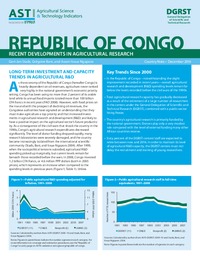Authors:
Stads, Gert-Jan; Bani, Grégoire; Itoua-Ngaporo, Assori
Year:
2010
Publisher
International Food Policy Research Institute; and General Delegation of Scientic and Technical Research (DGRST)
Back to:
The civil wars that shook Congo in the 1990s caused agricultural research investments to plummet. However, with the return of peace and the modest inflow of donor funding, agricultural R&D spending levels picked up again, albeit slightly. In 2008, Congo invested 1.2 billion CFA francs, or 4.6 million PPP dollars (both in 2005 prices); this total includes salaries, operating costs, program costs, as well as capital investments. By comparison with the situation observed in many other countries in the subregion, the level of donor funding to support Congo’s agricultural R&D remains very low.
Unlike their spending levels, the DGRST centers’ total research capacity levels show a decline during the period 2001–08. The drop in numbers is largely attributable to a significant number of researchers who left for retirement, compounded by the imposition of a public-sector hiring freeze. The average age of DGRST researchers currently exceeds 50 years, which places Congo’s researchers among the oldest in Africa. It is expected that between 2010 and 2016, 60 percent of DGRST’s permanent employees will reach retirement age. Needless to say, in the years to come, recruitment and training will constitute a major challenge.
Reviving Congo’s agricultural sector is crucial. It will contribute to reducing rural poverty and help economic diversification at a time when oil production, the country’s main source of income, is declining. However, Congo lacks a clear national agricultural research policy that is supported by strategic planning and entails long-term programs. The lack of coordination that characterizes the country’s research centers is linked to this absence of national guidelines and reflects the fact that guidance provided by DGRST lacks energy and forcefulness. The national government is currently in the process of regrouping research centers to form research institutes, but whether or not serious issues such as coordination, funding, recruitment, and training will be adequately addressed remains to be seen. It is clear that, in order to maintain a critical mass of agricultural scientists at the national level and to meet the technology demand triggered by Congo’s current ambitions to boost its agricultural development, the government of Congo will not only have to begin recruiting and training young researchers without any further delay, but it must also ensure the implementation of well-targeted, well-coordinated, and well-funded research programs.

